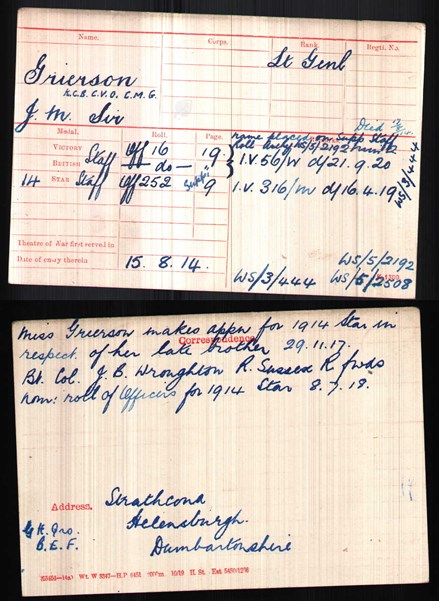Medal Index Cards
- Home
- World War I Articles
- Medal Index Cards
During the late part of the First World War the Army Medal Office began a system of making out an index card for each individual soldier (officers and other ranks). This was in order to create a record of the individual's entitlement to campaign medals and gallantry medals.
The Medal Index Card which were created include some or all of the following:
- the individual's name
- service number
- rank
- unit(s) served in
- date of enlistment
- the first theatre of war in which they served and a date (although this is generally only provided if it was before 1st January 1916)
- Medal(s) received
- the Army Medal Office Roll and issue number for each medal the person was entitled to
- whether the individual was killed or discharged
- remarks
- correspondence notes
- address
Some of this information may be shown on the reverse of the card.
A few years ago the Ministry of Defence was looking to dispose of the Medal Index Cards. There was a very real danger that the cards would be destroyed. Although the cards had previously been copied, this had only been done in low quality monochrome - and the reverse of the cards had not been copied.
In order to ensure the preservation of this vital set of documents, and to save the cards from destruction, The Western Front Association not only agreed to take custody of these cards but also but also arranged for these to be stored in a secure location. Importantly, they facilitated the copying of these cards by Ancestry.co.uk who subsequently made these available to subscribers to their site.
These medal index cards can be accessed by WFA members as part of their 'membership package' on the WFA's Library edition of Fold3. All you need to do is log-in to the WFA web site as a member and follow the links to the 'Pension Records'. This is a link to the log-in page.

Above: Medal Index Card for Lt-General Sir James Grierson
About British Army First World War Medal Index Cards
The collection currently contains approximately 4.8 million records, which is nearly all of the total collection. The records can be searched by first and last name and Corps, Unit or Regiment. These cards were created by the Army Medal Office (AMO) of the United Kingdom in Droitwich near the close of World War I.
The Medal Index Cards collection is the most complete listing of individuals who fought in the British Army in WWI, containing approximately 90% of soldiers’ names. The Index Cards were created in order to keep in one place details about a soldier’s medal entitlement.
Who were Awarded Medals?
Certain requirements needed to be met in order to qualify for certain medals (see medal descriptions below). However, nearly all soldiers who served abroad were awarded at least one medal.
About the Medals:
Medals awarded during WWI included:
- 1914 Star (Mons Star) was awarded for service in France or Flanders (Belgium) between 5 August and 22 November 1914
- 1914-15 Star was awarded for service in France or Flanders (Belgium) between 23 November 1914 and 31 December 1915, or for service in any theater between 5 August 1914 and 31 December 1915
- Allied Subjects Medal was awarded to individuals (not necessarily British) for service to the Allied cause, for example, by helping British Prisoners of War escape
- Allied Victory Medal (Victory Medal) was awarded for service in any operational theater between 5 August 1914 and 11 November 1918. It was issued to individuals who received the 1914 and 1914-15 Stars and to most individuals who were issued the British War Medal. The medal was also awarded for service in Russia (1919-1920) and post-war mine clearance in the North Sea (1918-1919).
- British War Medal was awarded to both servicemen and civilians that either served in a theater of war, or rendered service overseas between 5 August 1914 and 11 November 1918. It was also awarded for service in Russia, and post-war mine clearance in the Baltic, the Black Sea, and the Caspian Sea between 1919 and 1920.
- Distinguished Conduct Medal (DCM) was awarded to non-commissioned officers for bravery
- Distinguished Service Order (DSO) was generally awarded to officers ranked Major and higher for distinguished war service
- Military Cross Medal (MC) was awarded to commissioned officers of Captain and below, as well Warrant Officers, for valour during active operations
- Military Medal was awarded to non-commissioned officers for bravery in land battle
- Silver War Badge (SWB) was awarded to servicemen who became ill or were wounded while serving in a theatre of war or at home
- Territorial Force War Medal was awarded to servicemen who were members of the Territorial Force either on or before 30 September 1914 and who served in an operational theater abroad between 5 August 1914 and 11 November 1918
- Victoria Cross Medal (VC) was awarded for valour in the face of the enemy





